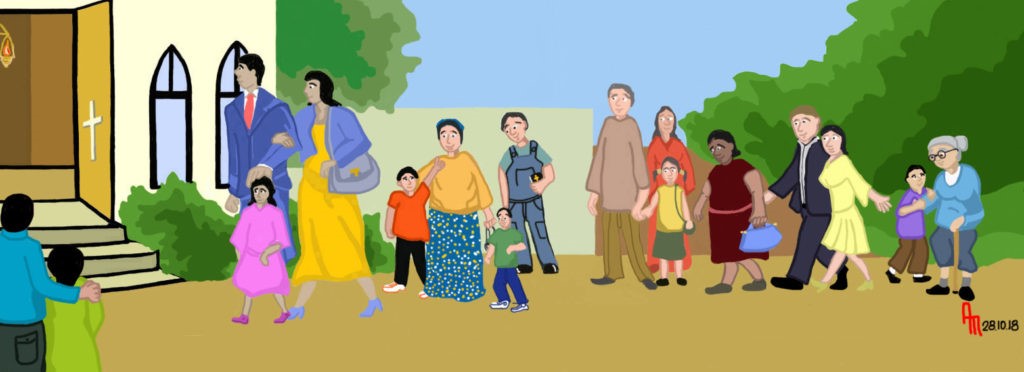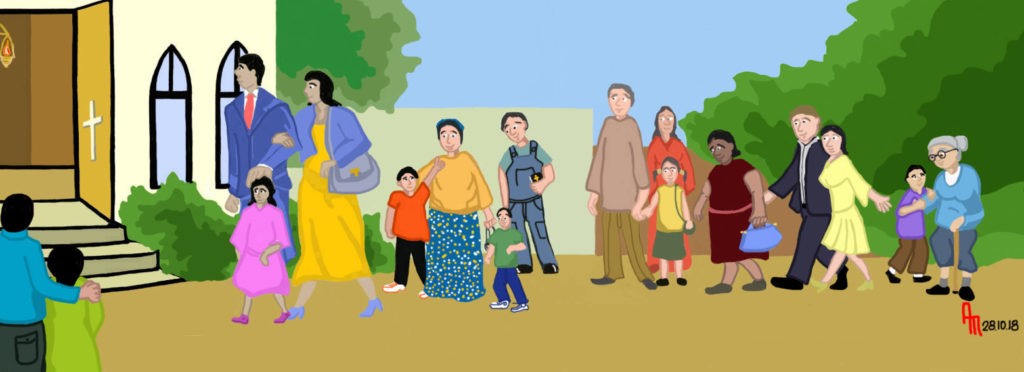Gospel: Dt 6:2-6; Heb 7:23-28; Mk 12:28B-34
– Rev José Mario O Mandía
The commandment of love is the greatest and most difficult of all the commandments. The reason is simple: it includes all the others. Love is the summit of all virtues (cf I Cor 13:13), and if one virtue is lacking, love is lacking.
Remember what St Paul says about love being “patient and kind,” that it “is not jealous or boastful, not arrogant or rude, does not insist on its own way, is not irritable or resentful, does not rejoice at wrong, but rejoices in the right, bears all things, believes all things, hopes all things, endures all things” (I Cor 13:4-7). Sigh!
In another letter, he says, “Bless those who persecute you; bless and do not curse them. Rejoice with those who rejoice, weep with those who weep. Live in harmony with one another; do not be haughty, but associate with the lowly; never be conceited. Repay no one evil for evil, but take thought for what is noble in the sight of all. If possible, so far as it depends upon you, live peaceably with all. Beloved, never avenge yourselves, but leave it to the wrath of God; for it is written, ‘Vengeance is mine, I will repay, says the Lord.’ No, ‘if your enemy is hungry, feed him; if he is thirsty, give him drink; for by so doing you will heap burning coals upon his head.’ Do not be overcome by evil, but overcome evil with good” (Rom 12:14-21). Oh, how can I ever do all of that? No one among us can say he/she has fulfilled all of them. Yes, all of us fail in love. Every day.
So what are we to do?
“Oh, Father, that person is just so difficult! I just can’t …”
Ah, that’s the point! We just can’t, we are just not capable of loving with our own strength. “Apart from me you can do nothing” (Jn 15:5). So when we receive our Lord in Holy Communion, let us beg of Him, “My Lord, my God, my Creator and Savior, You have the power make all things new. Change my heart, fashion it after Your own merciful Heart. Give me the strength and the courage to love.”
Let us also ask for His forgiveness more often in the Sacrament of Reconciliation because we only learn to forgive when we have been forgiven ourselves. St Augustine says, “We cannot love, unless we have first been loved.” And forgiveness is a great act of love.
Can we love our neighbor without living God?
Fernando Armellini SCJ
Claretian Publications Macau
Today’s Gospel is set in a controversial context. After Jesus drove out the merchants from the holy place (Mk 11:15-18), the angered religious authorities come with tricky questions, to weigh his every word in order to find some pretext to accuse him and to take him out of the way.
Unlike the previuos ill intentioned questions, here is a genuine scribe who attended the earlier controversies comes forward and puts also a question: “Which commandment is the first of all?”
Studying the Holy Scriptures, the rabbis had made 613 commandments of which 365 negative precepts (don’t do) and 248 positive precepts (to do). Later it became a matter of debate among the rabbis to summarize them into the most essential since the rules were too many. The scribe wanted to get the opinion of Jesus.
The answer Jesus gives to the scribe retakes the best-known of prayers of his people: “Hear, Israel. The Lord, our God, is one Lord; and you shall love the Lord your God with all your heart, with all your soul, and with all your strength.” Then, without being asked, he added a second commandment, based on the book of Leviticus: “You shall love your neighbor as yourself” (Lev 19:18).
Love of people demands commitment to make sure that no one goes without food, clothing, care, education and all that is necessary for life. However, this commitment must not overshadow the duty to God, prayer, Sunday Mass, and religious practices. A part of the time must be dedicated to work, to family, to friends, but woe to one who steals from God the part he deserves.
In the Gospel of John, Jesus says, “This is my (only!) command, that you love one another” (Jn 15:17), and Paul says that he who loves his fellowman has fulfilled the whole law. The two commandments cannot, therefore, be separated, because they are the manifestation of a single love, as John says, “If you say, ‘I love God’ while you hate your brother or sister, you are a liar. How can you love God whom you do not see if you do not love your brother whom you see?” (1 Jn 4:20).
Is there a danger of loving man without loving God? Not at all! If anyone loves man certainly he is animated by the Spirit, because love can only come from God (1 Jn 4:7).
What remains now is to clarify who Jesus meant by neighbor.
Jesus puts an end to all discrimination and states unequivocally, a neighbor is anyone in need, be s/he friend or foe (Mt 5:43-48).



 Follow
Follow


